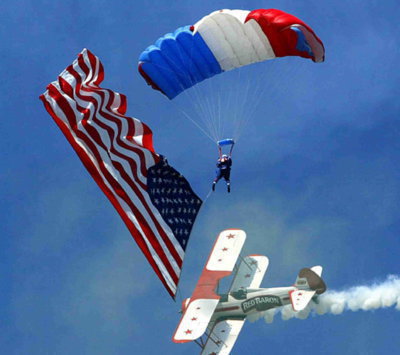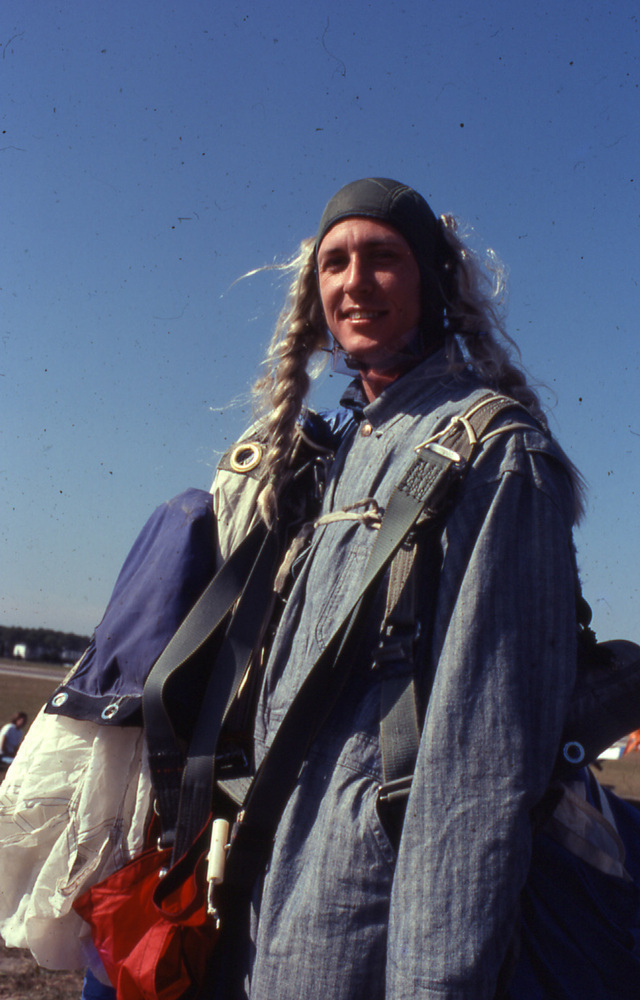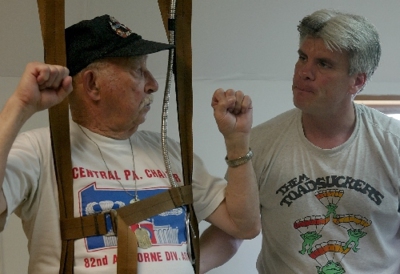Recommended Posts
nigel99 143
QuoteIt's about training. Being mentally prepared is in my opinion the most important thing. As someone mentioned earlier about military training it is all about proper repitition in training. When the yelling starts during military training you can witness the "coolest of cucumbers" freeze up and start stuttering or fail to react. By the end of training the recruit/candidate instinctually reacts instead of freezing and completes the task despite the stress.
People touch every handle before a jump for repitition and sure it can be argued that many are only going through the motions but atleast they are building memory. It's the people that float through the sport hoping to never have a mal that freeze up and don't prepare for the worst. I have only had a few severe line twists but I snuck a peak at my alti, realized I had time and corrected it. It's all about situational awareness and the correct response to the situation. Condition your self for when you are going to have a malfunction and not if, because it will happen. For some it may take more training to be able to react to stress maybe because of their lifestyle or predisposition but anyone can be trained to react correctly. And things may still go wrong, be prepared.
Since I have never had a highspeed mal or a cutaway I watch youtube videos of mals, think about what happened what should be done and what the person did incorrectly. It's why I read the incident and fatality reports so that what happened to another can be learned from. I don't just hope to react correctly, you have to mentally train to react correctly.
On an off heading opening I had a near canopy collision in which the SIM response would have been to been to use the right riser to steer out of the situation. I used my left riser however, because of situational awareness, the other person was traveling cross face from left to right in my direction. Using the right riser would have brought us closer together and maybe resulted in a canopy collision. The other canopy pilot used his toggles and pulled so hard his canopy collapsed and resulted in a cutaway/aad fire. What did I learn from the situation? better tracking would have avoided this entirely and going "by the book" could have killed both of us.
Yes the military are a perfect example. I find it interesting as on a certain level it would be nice to know who is pre-disposed to freezing up BEFORE things go wrong.
TampaPete 35
These are my two benchmarks for not freezing.
Both jumpers are right at the point of no return and make it out. The double mal is an experienced jumper. The cadet jumper is on his first jump.
http://www.youtube.com/watch?v=HpOCsQCKi7I
http://www.youtube.com/watch?v=6klvGVtw-HA
QuoteThat’s why the military practices real situations in extremely stressful conditions.
These are my two benchmarks for not freezing.
Both jumpers are right at the point of no return and make it out. The double mal is an experienced jumper. The cadet jumper is on his first jump.
http://www.youtube.com/watch?v=HpOCsQCKi7I
http://www.youtube.com/watch?v=6klvGVtw-HA
Branching to a discussion in another thread...
In the 1st one a quick swipe with a hook knife may have helped with the reserve getting 'more' open.
~ If you choke a Smurf, what color does it turn? ~
So I started to tell my students to enjoy the fear. Before that I had done the same as everyone else and try to convince people not to be afraid, because the gear was great, emergency procedures, blah, blah, blah. When I started telling them to be as afraid as possible and enjoy it, because they would never get that feeling again. The second jump is less scary than the first, etc. People spend a fortune on scary movies and roller coasters to get scared, so enjoy it.
People seemed to jumped better.
The other thing I learned from a guy named George Mc Cormick is to be angry at your stuff if it doesn't work. Swearing and cusing at your canopy if it mals on you, puts you in a better mind set than fear. The things I have called a canopy, have not been nice!
scr 316
MarkM 0
That's due to training. She's driven a car for so long that there's no thinking about how to "stop" a car, it's just a reflex.
The problem is with new situations we have to think how to react properly, like your wife on the motorcycle. The way around that is to eliminate thinking during the event and just train the ability to recognize the situation and do the proper response.
Hence the "rules" in skydiving that give us specific responses to known situations.
For the record, I crashed a motorcycle same way when I was learning. A turn got out of control, I leaned back which twisted my wrist(which gave me even more throttle), brain locked about how to stop the bike and threw it under a parked car. Years later I took professional courses, learned to ride and did so for about 10 years.
Doing static line training I'd sensory overload during my PRCPs. I'd do it wrong but not remember why or how I was doing it wrong. The only way I got through that was to practice my pulls in a swimming pool a few hundred times. I aced my next jumps and I've never since had a problem going for and finding my handle even though I use a small freefly handle and have to reach around large wingsuit wings.
Every time you do something and have a favorable result, you expect that same result more and more. If things change, you might fuck yourself, even if you KNOW what you need to do.
Niki1 1
These articles all came to the conclussion that we all experience EITHER time contraction or time expansion in stress situations. I don't remember if there was an explanatin as to why some experience one and not the other.
When I started teaching first jump courses, I always asked my students if they had ever been in any kind of emergency situation before like a car wreck for instance. Some of them could describe moment by moment what happened and take 5 or 10 minutes to tell about a 5 second event. Some said. "I looked up and the other car hit me." It was the second type that turned out to better suited for bowling.
But even with the bowling group, in a stressful situation, people will revert to their training. I've seen people handle malfunctions very well and not be able to tell me what happened in a detailed way.
I don't know if this time expansion/contraction thing is nature or nurture but I know it's real. I would lean toward nurture. Being involved in sports at an early age may help develope the awareness needed in stress situations.
One of the things Ken Coleman said when he was first writting the program that became AFF is that skydiving was not for everyone.
Tandem filled the gap. It lets the bowlers jump out of an airplane and go back to bowling or whatever it is that they do. It's the tandem masters, even the ones who I think are not as good as they should be, who have the time expansion characteristic.
Louis D Brandeis
Where are we going and why are we in this basket?
I think it's nature & nurture. Training is vitally important, but if you don't have the will to survive, all the training is worthless. I like the comment about being angry at your equipment when stuff goes wrong. Getting mad certainly puts the focus on surviving.
Niki1 1
QuoteTime contraction/expansion is definitely real. I've been through a number of "high stress" events, with some on video. I've always been amazed at the disconnect between the amount of time I thought had passed during the event, and how little time actually passed in reviewing the event.
I think it's nature & nurture. Training is vitally important, but if you don't have the will to survive, all the training is worthless. I like the comment about being angry at your equipment when stuff goes wrong. Getting mad certainly puts the focus on surviving.
I think whatever works for you. I like to (try) use the calm approach. Like Wyatt Earp said, "You have to take your time, real fast."
Louis D Brandeis
Where are we going and why are we in this basket?
nigel99 143
I do know on a personal level that I "over think" situations and need to force myself to relax.
QuotevVry interesting thanks. on a persoanl level I handle stress considerably better when i am fit. i am trying to put what you have said into context within my experiences. i can remember every detail of dropping my bike and yet I have also had a floating handle that I only know about as my jumpmaster told me that I did (no recollection or knowledge that anything was wrong on the jump. i don't know if that should encourage or scare me.
I do know on a personal level that I "over think" situations and need to force myself to relax.
When ya find yourself scared shitless, just ACT cool calm and collected...people around you can't tell the difference, and after a while YOU can't either!
~ If you choke a Smurf, what color does it turn? ~
Niki1 1
QuotevVry interesting thanks. on a persoanl level I handle stress considerably better when i am fit. i am trying to put what you have said into context within my experiences. i can remember every detail of dropping my bike and yet I have also had a floating handle that I only know about as my jumpmaster told me that I did (no recollection or knowledge that anything was wrong on the jump. i don't know if that should encourage or scare me.
I do know on a personal level that I "over think" situations and need to force myself to relax.
To me, reaction means starting a responce to a situation. During those micro seconds while starting the reaction, you're still thinking. A poster above described a near canopy colision avoided becarse he did the opposite of a trainning procedure. But I would guarantee that his hands were moving when he decided to alter his rejlexive responce.
And a word about trainning. Trainning others. You may tell them that practice makes perfect. That's not true. Practice make perminent. Perfect practice makes perfect perminently. Make sure the trainning is correct. That is what will save thieir ass when the sokid waste hits the rotary air handler.
Louis D Brandeis
Where are we going and why are we in this basket?
Quote
I do know on a personal level that I "over think" situations and need to force myself to relax.
Nigel,
I see this in nearly all your posts.
When you get here, we'll have a talk about it.
"Overthinking is symptom of under confidence"
We'll talk about focus...what to focus on and how to do that.
I think we're all Bozos on this bus.
Falcon5232, SCS8170, SCSA353, POPS9398, DS239
bluepill 0
Interesting question. I'm not entirely sure it has much to do with danger or fear.
I had brain lock at level 3 of AFF and an instructor had to come in and dump for me. The first half of the dive went well, but once released I initially became focused on stopping a turn. After that, the next thing I knew I was under canopy. Video playback shows I simply froze - I was completely out to lunch for some time.
Fear had nothing to do with it, I believe it was more to do with the state of my mind at the time (I was tired) and that I was confronted with to much previously unexperienced input for my tired mind to adequately cope with at that moment.
I used to race motocross and trained as much as I could, over and over. When it came to racing, off the start of a race and for the first few laps I would be in the zone. I wouldent even be 'thinking' about what to do next other than how to get past the guy in front. My training would pay off.
Funny thing though, if I built up too big a lead, there would be a period where my lap times would fall off dramatically and I would be visibly slower and wooden looking. Rather than just riding and railing a berm I would begin to 'over think' how to take the next corner and think about my gears and braking etc. After a couple of laps of course my lap times would pick up again. I believe because my brain had re-aquainted itself with the repetition of the thought process of the previous laps.
I've never had a major mal yet, but a inexperienced guy I was on a dive with did, and he executed his EP without hesitation. When I asked him what happened he said he looked up and seen pretty much what he had seen earlier that morning on one of the mal cards and went straight into his EP that he had practised many times that morning - it was as if it was second nature.
Later that night a really hot chick came up to him and started talking to him - he froze. ![]()
![]()
IMO it is very little to do with danger - more to do with your state of mind at the time and having to suddenly think, rather than think AND act.
BP ![]()







thanks it is in my basket - looks good.
Share this post
Link to post
Share on other sites